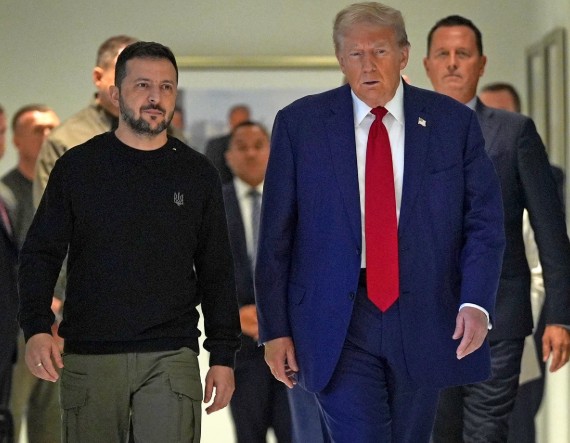Trump Wants Ukraine’s “Valuable Rare Earth” as Compensation for Continued Military Aid

In a striking statement that has raised eyebrows around the world, U.S. President Donald Trump has declared that while he intends to continue funding Ukraine’s war effort, he expects something in return control over Ukraine’s valuable rare earth metals. These critical minerals, essential for U.S. high-tech and defense industries, are at the heart of his proposed deal. Trump’s remarks come as Ukraine’s President Volodymyr Zelenskyy responded positively, signaling openness to foreign investments, especially from U.S. companies, in Ukraine’s mining sector.
Ukraine has long been known for its vast agricultural output, supplying the world with wheat, barley, and other key commodities. However, the country also sits atop rich deposits of rare earth metals minerals vital to the manufacturing of smartphones, electric vehicles, batteries, and advanced weaponry. With these resources becoming increasingly critical to global supply chains, Trump’s proposal highlights the geopolitical leverage such minerals could provide to the U.S. as it continues its support for Ukraine in the ongoing war with Russia.
During a recent appearance, Trump reiterated his long-held stance that U.S. involvement in the Ukraine conflict should come with a substantial return for American interests. “If we’re going to be sending billions of dollars in aid, there has to be something in it for us,” Trump remarked. He added that securing rights to Ukraine’s rare earth minerals could help power America’s high-tech industries and strengthen its defense capabilities, particularly in the face of global competition with China, which dominates the rare earth market.
“Ukraine has a treasure trove of valuable minerals that the United States needs for our technological and defense industries,” Trump said, stressing that he would leverage U.S. support for Ukraine as a bargaining chip in negotiations over the rights to these resources. Trump’s proposal, while bold, also draws attention to the broader global competition for access to rare earths, a market heavily influenced by both China and other emerging economies.
In response, President Zelenskyy expressed openness to the idea of attracting U.S. investment into Ukraine’s rare earth and critical minerals sectors. Speaking in a televised interview, Zelenskyy stated, “We welcome any initiative that can bring investment into our country and help us rebuild, especially in sectors like energy and technology. If U.S. companies are interested in our resources, we are ready to cooperate.”
The Ukrainian president emphasized that such collaborations would need to be transparent and mutually beneficial, ensuring that they contribute not only to Ukraine’s recovery but also to global stability and security. “These minerals are a national asset,” Zelenskyy added, noting that Ukraine would remain cautious in any deal that might jeopardize its sovereignty or the well-being of its people.
Ukraine’s rare earth metals industry, while underdeveloped compared to major producers like China, holds enormous potential. The country has large reserves of rare earth elements like lithium, cobalt, and graphite, all of which are crucial for the production of electric vehicle batteries, high-tech electronics, and military-grade equipment. Securing access to these resources could not only boost Ukraine’s economy but also provide a strategic advantage in the ongoing geopolitical battle.
Trump’s proposal also raises the question of how foreign interests, particularly from the U.S., might reshape Ukraine’s economy in the aftermath of the war. The involvement of American companies in Ukraine’s mining industry could bring much-needed investment and infrastructure development, but it also risks increasing foreign influence over the country’s natural resources. For many Ukrainians, the prospect of having their country’s wealth extracted by foreign companies raises concerns about exploitation and control.
The idea of linking military aid to resource extraction is not without controversy. Critics argue that such an approach could undermine the integrity of Ukraine’s sovereignty, turning the country into a strategic pawn in the global competition for resources. Some fear that if the U.S. or other foreign powers gain too much control over Ukraine’s rare earth minerals, it could lead to long-term exploitation at the expense of the Ukrainian people.
In contrast, proponents of the deal point to the potential economic benefits for Ukraine. The infusion of foreign capital could revitalize industries that have been neglected or damaged by years of conflict. Moreover, securing rights to the rare earth minerals could help Ukraine maintain independence from countries like Russia and China, which have historically exerted influence over the region’s natural resources.
As the war drags on, Ukraine continues to look for ways to secure its future, both militarily and economically. The notion of trading access to valuable resources in exchange for continued support from the West is one that is likely to spark heated debates in both Ukraine and the United States. For now, the idea remains on the table, with both Trump and Zelenskyy signaling a willingness to explore the possibilities.
The prospect of Ukraine’s rare earth minerals being tied to the U.S. war effort could significantly alter the landscape of the ongoing conflict. As the world watches closely, the question remains: will this proposal lead to a strategic partnership that benefits both nations, or will it further complicate the path to peace and recovery in Ukraine?
